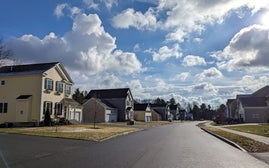More Homeowners Stay Put, Forcing Central Mass. Prices Up
As home values have ticked upward and unemployment has fallen over the past year, Timothy Warren, chairman of real estate tracking firm The Warren Group, figured owners who had been waiting for better conditions to sell would finally come off the sidelines.
"Apparently they're not," Warren said in a May 2 telephone interview. "I thought there was a lot of pent-up demand among sellers and I was wrong about that."
The data bear it out. In the Worcester metropolitan area (essentially Worcester County), the number of homes on the market for the first three months of the year averaged 2,847 a month. That amounts to a 5.1-month-long supply. It was as low as 4.8 in February.
Inventory hasn't been at such low levels since 2005, according to data from the Massachusetts Association of Realtors (MAR).
The story is the same across the state. In March, there were 19,761 for-sale listings, down 30 percent from the same month in 2012, according to MAR.
That equates to the 5.1-month supply, down from 8.6 a year ago.
Warren, whose company publishes Banker & Tradesman, believes some homeowners may have lost so much value in the 2008 recession that they're willing to keep waiting for their assessments to rise.
Foreclosure activity has also slowed, but Warren doesn't think that's having a noticeable impact on inventory levels.
Competition Driving Prices Up
David Stead, a broker associate with RE/MAX Advantage in Worcester, said low inventory is having noticeable effects in his business.
"When new homes come on (the market), buyers are just so eager to jump on them you get a bit of a feeding frenzy," Stead said.
It has resulted in rising sale prices. Warren Group data show a statewide median sale price of $285,000 in March, up from $263,000 a year earlier. Lower inventory could be contributing to slow sales activity, which dropped 3.6 percent.
The median price in Worcester County shot up to $211,000 in March from $148,500 in February, cracking the $200,000 mark for the first time in 2013. A year ago, the median price was $192,000.
The question, Warren said, is whether or not it's a healthy increase.
He doesn't believe it's sustainable, and would prefer to see the supply-demand balance even out.
Stead said the mismatch means he can now show clients most of the available area inventory that fits their criteria in just two days; that process used to take upwards of five days.
He's not alarmed about the situation. He just hopes those looking to sell their homes will do so.
"We have to be optimists," he said. "It seems like things are stabilizing."
Are Builders The Answer?
While sellers who are still holding off on selling are thought to be one key factor in the low inventory, another is new construction, or lack of it.
Census data show that construction permits for single-family homes in the Worcester metro area totaled just 788 in 2012, down from 791 the year before and nearly half of their 2010 and 2009 levels.
Guy Webb, executive director of the Builders Association of Central Massachusetts, said news of low inventory levels isn’t going to magically spur builders to start putting up new homes.
“It’s much more complicated than that,” Webb said. “That there’s more demand than supply tells you just how bad supply is, because demand isn’t great.”
Though things have improved, builders remain cautious, contending with still-tight bank lending and local zoning restrictions — like large-lot zoning — that can render unbuildable the fewer and fewer open parcels that remain.
Webb thinks generational changes, such as fewer young people getting married and starting households, are also affecting the market. In addition, prices for plywood and framing wood have also jumped more than 40 percent recently.
“There’s no single thing,” he said. “It’s capital, and it’s people being conservative because no one feels really confident with the economy yet.”
Despite the barriers he perceives to a more robust housing market, he thinks the numbers will improve this year. His members are generally feeling a bit better about the market. They just realize that work is going to come sporadically and improvement will be gradual.
Read more
Tight Inventories Drive Home Sales Down
Mass Economy Has Strong First Quarter
Realtor Confidence Rises Again In July















0 Comments